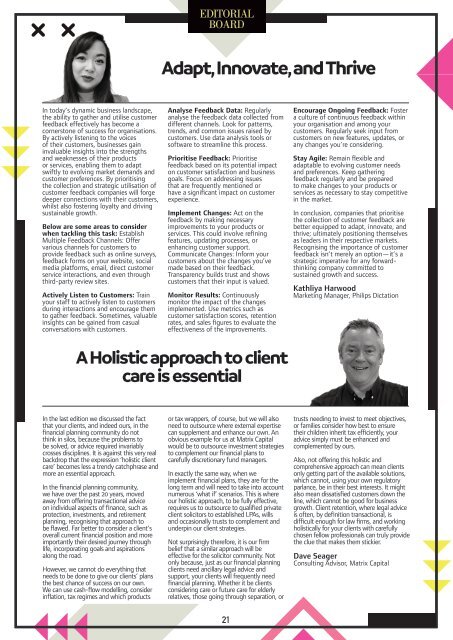Modern Law Magazine Issue 69
You also want an ePaper? Increase the reach of your titles
YUMPU automatically turns print PDFs into web optimized ePapers that Google loves.
EDITORIAL<br />
BOARD<br />
Adapt, Innovate, and Thrive<br />
In today’s dynamic business landscape,<br />
the ability to gather and utilise customer<br />
feedback effectively has become a<br />
cornerstone of success for organisations.<br />
By actively listening to the voices<br />
of their customers, businesses gain<br />
invaluable insights into the strengths<br />
and weaknesses of their products<br />
or services, enabling them to adapt<br />
swiftly to evolving market demands and<br />
customer preferences. By prioritising<br />
the collection and strategic utilisation of<br />
customer feedback companies will forge<br />
deeper connections with their customers,<br />
whilst also fostering loyalty and driving<br />
sustainable growth.<br />
Below are some areas to consider<br />
when tackling this task: Establish<br />
Multiple Feedback Channels: Offer<br />
various channels for customers to<br />
provide feedback such as online surveys,<br />
feedback forms on your website, social<br />
media platforms, email, direct customer<br />
service interactions, and even through<br />
third-party review sites.<br />
Actively Listen to Customers: Train<br />
your staff to actively listen to customers<br />
during interactions and encourage them<br />
to gather feedback. Sometimes, valuable<br />
insights can be gained from casual<br />
conversations with customers.<br />
Analyse Feedback Data: Regularly<br />
analyse the feedback data collected from<br />
different channels. Look for patterns,<br />
trends, and common issues raised by<br />
customers. Use data analysis tools or<br />
software to streamline this process.<br />
Prioritise Feedback: Prioritise<br />
feedback based on its potential impact<br />
on customer satisfaction and business<br />
goals. Focus on addressing issues<br />
that are frequently mentioned or<br />
have a significant impact on customer<br />
experience.<br />
Implement Changes: Act on the<br />
feedback by making necessary<br />
improvements to your products or<br />
services. This could involve refining<br />
features, updating processes, or<br />
enhancing customer support.<br />
Communicate Changes: Inform your<br />
customers about the changes you’ve<br />
made based on their feedback.<br />
Transparency builds trust and shows<br />
customers that their input is valued.<br />
Monitor Results: Continuously<br />
monitor the impact of the changes<br />
implemented. Use metrics such as<br />
customer satisfaction scores, retention<br />
rates, and sales figures to evaluate the<br />
effectiveness of the improvements.<br />
Encourage Ongoing Feedback: Foster<br />
a culture of continuous feedback within<br />
your organisation and among your<br />
customers. Regularly seek input from<br />
customers on new features, updates, or<br />
any changes you’re considering.<br />
Stay Agile: Remain flexible and<br />
adaptable to evolving customer needs<br />
and preferences. Keep gathering<br />
feedback regularly and be prepared<br />
to make changes to your products or<br />
services as necessary to stay competitive<br />
in the market.<br />
In conclusion, companies that prioritise<br />
the collection of customer feedback are<br />
better equipped to adapt, innovate, and<br />
thrive; ultimately positioning themselves<br />
as leaders in their respective markets.<br />
Recognising the importance of customer<br />
feedback isn’t merely an option—it’s a<br />
strategic imperative for any forwardthinking<br />
company committed to<br />
sustained growth and success.<br />
Kathliya Harwood<br />
Marketing Manager, Philips Dictation<br />
A Holistic approach to client<br />
care is essential<br />
In the last edition we discussed the fact<br />
that your clients, and indeed ours, in the<br />
financial planning community do not<br />
think in silos, because the problems to<br />
be solved, or advice required invariably<br />
crosses disciplines. It is against this very real<br />
backdrop that the expression ‘holistic client<br />
care’ becomes less a trendy catchphrase and<br />
more an essential approach.<br />
In the financial planning community,<br />
we have over the past 20 years, moved<br />
away from offering transactional advice<br />
on individual aspects of finance, such as<br />
protection, investments, and retirement<br />
planning, recognising that approach to<br />
be flawed. Far better to consider a client’s<br />
overall current financial position and more<br />
importantly their desired journey through<br />
life, incorporating goals and aspirations<br />
along the road.<br />
However, we cannot do everything that<br />
needs to be done to give our clients’ plans<br />
the best chance of success on our own.<br />
We can use cash-flow modelling, consider<br />
inflation, tax regimes and which products<br />
or tax wrappers, of course, but we will also<br />
need to outsource where external expertise<br />
can supplement and enhance our own. An<br />
obvious example for us at Matrix Capital<br />
would be to outsource investment strategies<br />
to complement our financial plans to<br />
carefully discretionary fund managers.<br />
In exactly the same way, when we<br />
implement financial plans, they are for the<br />
long term and will need to take into account<br />
numerous ‘what if’ scenarios. This is where<br />
our holistic approach, to be fully effective,<br />
requires us to outsource to qualified private<br />
client solicitors to established LPAs, wills<br />
and occasionally trusts to complement and<br />
underpin our client strategies.<br />
Not surprisingly therefore, it is our firm<br />
belief that a similar approach will be<br />
effective for the solicitor community. Not<br />
only because, just as our financial planning<br />
clients need ancillary legal advice and<br />
support, your clients will frequently need<br />
financial planning. Whether it be clients<br />
considering care or future care for elderly<br />
relatives, those going through separation, or<br />
trusts needing to invest to meet objectives,<br />
or families consider how best to ensure<br />
their children inherit tax efficiently, your<br />
advice simply must be enhanced and<br />
complemented by ours.<br />
Also, not offering this holistic and<br />
comprehensive approach can mean clients<br />
only getting part of the available solutions,<br />
which cannot, using your own regulatory<br />
parlance, be in their best interests. It might<br />
also mean dissatisfied customers down the<br />
line, which cannot be good for business<br />
growth. Client retention, where legal advice<br />
is often, by definition transactional, is<br />
difficult enough for law firms, and working<br />
holistically for your clients with carefully<br />
chosen fellow professionals can truly provide<br />
the clue that makes them stickier.<br />
Dave Seager<br />
Consulting Advisor, Matrix Capital<br />
21
















